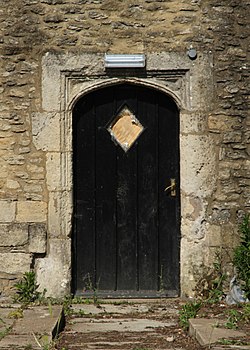pintu
Jump to navigation
Jump to search
See also: pintu'
Iban
[edit]Pronunciation
[edit]Noun
[edit]pintu
Classifier
[edit]pintu
- Classifier used for buildings.
- Lima pintu rumah. ― Five houses
- Empat puluh pintu kedai ― Forty shops
Indonesian
[edit]
Alternative forms
[edit]Etymology
[edit]Pronunciation
[edit]- (Standard Indonesian) IPA(key): /ˈpintu/ [ˈpin.t̪u]
Audio: (file) - Rhymes: -intu
- Syllabification: pin‧tu
Noun
[edit]pintu (first-person possessive pintuku, second-person possessive pintumu, third-person possessive pintunya)
- door
- barrier: a structure that bars passage.
- Synonym: palang pintu
- (figurative) way: a method or manner of doing something.
- Synonym: jalan
- gate: a passageway (as in an air terminal) where passengers can embark or disembark.
Derived terms
[edit]- pintu air
- pintu api
- pintu bahaya
- pintu bak lumpur
- pintu belakang
- pintu bilah
- pintu butulan
- pintu corong
- pintu darurat
- pintu depan
- pintu dorong
- pintu dorong otomatis
- pintu gapura
- pintu garasi
- pintu garis
- pintu gerbang
- pintu gerbang wisata
- pintu geser
- pintu jendela
- pintu kedap cuaca
- pintu keluar
- pintu kolong
- pintu kubu
- pintu kubur
- pintu lawang
- pintu lewat
- pintu maling
- pintu masuk
- pintu mati
- pintu monyet
- pintu panggung
- pintu pelekah
- pintu pelintasan kereta api
- pintu putar
- pintu putar manual
- pintu rangkap
- pintu rezeki
- pintu salah
- pintu samping
- pintu sekat
- pintu selubung kamar mesin
- pintu sluis
- pintu sorok
- pintu sorong
- pintu tani
- pintu terbuka
- pintu tertutup
- pintu udara
Further reading
[edit]- “pintu” in Kamus Besar Bahasa Indonesia, Jakarta: Agency for Language Development and Cultivation – Ministry of Education, Culture, Research, and Technology of the Republic of Indonesia, 2016.
Kapampangan
[edit]Etymology
[edit]Pronunciation
[edit]Noun
[edit]pintû
Derived terms
[edit]- kapamintu
- kapamintuan (“obedience”)
- mamintu (“to obey”)
- pamintuan
- Pamintuan
Malay
[edit]Etymology
[edit]Probably from Proto-Mon-Khmer *nt₁uuʔ (“hole, pit”).[1]
Pronunciation
[edit]Noun
[edit]pintu (Jawi spelling ڤينتو, plural pintu-pintu, informal 1st possessive pintuku, 2nd possessive pintumu, 3rd possessive pintunya)
- door (portal of entry into a building or room)
Descendants
[edit]References
[edit]Further reading
[edit]- “pintu” in Pusat Rujukan Persuratan Melayu | Malay Literary Reference Centre, Kuala Lumpur: Dewan Bahasa dan Pustaka, 2017.
Categories:
- Iban terms with IPA pronunciation
- Iban lemmas
- Iban nouns
- Iban classifiers
- Iban terms with usage examples
- Indonesian terms inherited from Malay
- Indonesian terms derived from Malay
- Indonesian 2-syllable words
- Indonesian terms with IPA pronunciation
- Indonesian terms with audio pronunciation
- Rhymes:Indonesian/intu
- Rhymes:Indonesian/intu/2 syllables
- Indonesian lemmas
- Indonesian nouns
- Kapampangan terms with IPA pronunciation
- Kapampangan lemmas
- Kapampangan nouns
- Malay terms derived from Proto-Mon-Khmer
- Malay terms with IPA pronunciation
- Rhymes:Malay/intu
- Rhymes:Malay/tu
- Rhymes:Malay/u
- Malay lemmas
- Malay nouns
